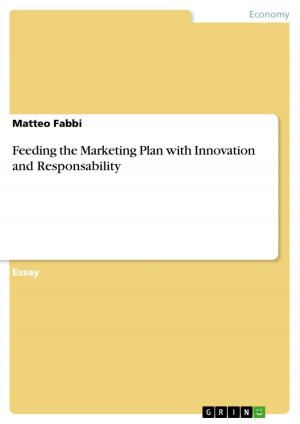Sharia - The Islamic Law
The Islamic Law
Nonfiction, Religion & Spirituality, Middle East Religions, Islam| Author: | Corinna Standke | ISBN: | 9783640141326 |
| Publisher: | GRIN Publishing | Publication: | August 19, 2008 |
| Imprint: | GRIN Publishing | Language: | English |
| Author: | Corinna Standke |
| ISBN: | 9783640141326 |
| Publisher: | GRIN Publishing |
| Publication: | August 19, 2008 |
| Imprint: | GRIN Publishing |
| Language: | English |
Seminar paper from the year 2008 in the subject Orientalism / Sinology - Islamic Studies, grade: 1,7, University of Hildesheim (Institut für Angewandte Sprachwissenschaft), course: Ba-Seminar Interkulturelle Kommunikation, 18 entries in the bibliography, language: English, abstract: Today, we live in a multicultural society. In our nearest environment there are people from different cultures or religions and they are part of our society. Muslims are one group that participates in our daily lives. For example, we are surrounded by many Turkish people, without really knowing which principles they follow. If we open a newspaper, we find plenty of articles dealing with Sharia, the Islamic law. There is for example the Archbishop of Canterbury who wants to integrate Islamic law into British law. And at present, the debate on headscarves in Turkish universities revives. Once in a while, we hear from women who are sentenced to death because they had unlawful sexual intercourse. But what do we really know about Muslims? Which rules do they follow and where do these rules come from? If we cannot answer this question, it is difficult to understand why there are these harsh punishments in some Islamic countries and why Islam is so important for the social development of these countries. There are Islamically inspired schools, clinics, social welfare services, and insurance and finance companies that have proliferated. Governments have to face crises of identity and political legitimacy and they are pressured to reformulate values and legislation within an Islamic framework. Some people call for the implementation of Sharia and others call for the Islamization of existing laws. In my paper, I will give an insight into Sharia and I will show how it is implemented in different Islamic countries. As this is a very complex topic, I will focus on the origin of Sharia, customs, family law, and crime and punishment, so as to explain the main principles of Muslim faith.
Seminar paper from the year 2008 in the subject Orientalism / Sinology - Islamic Studies, grade: 1,7, University of Hildesheim (Institut für Angewandte Sprachwissenschaft), course: Ba-Seminar Interkulturelle Kommunikation, 18 entries in the bibliography, language: English, abstract: Today, we live in a multicultural society. In our nearest environment there are people from different cultures or religions and they are part of our society. Muslims are one group that participates in our daily lives. For example, we are surrounded by many Turkish people, without really knowing which principles they follow. If we open a newspaper, we find plenty of articles dealing with Sharia, the Islamic law. There is for example the Archbishop of Canterbury who wants to integrate Islamic law into British law. And at present, the debate on headscarves in Turkish universities revives. Once in a while, we hear from women who are sentenced to death because they had unlawful sexual intercourse. But what do we really know about Muslims? Which rules do they follow and where do these rules come from? If we cannot answer this question, it is difficult to understand why there are these harsh punishments in some Islamic countries and why Islam is so important for the social development of these countries. There are Islamically inspired schools, clinics, social welfare services, and insurance and finance companies that have proliferated. Governments have to face crises of identity and political legitimacy and they are pressured to reformulate values and legislation within an Islamic framework. Some people call for the implementation of Sharia and others call for the Islamization of existing laws. In my paper, I will give an insight into Sharia and I will show how it is implemented in different Islamic countries. As this is a very complex topic, I will focus on the origin of Sharia, customs, family law, and crime and punishment, so as to explain the main principles of Muslim faith.















